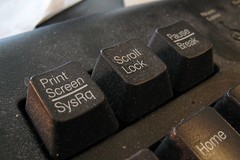Part 1 of the Chemical Reaction Artifact series of posts.
I'm teaching at a new school this year. I've been unhappy with how little I've been able to integrate projects that involve students creating an "artifact of their learning." I've been doing too much sage-on-the-staging, which I greatly dislike for a great many reasons.
I'm teaching a freshman level class (Integrated Science) that by some coincidence happens to be very similar to some classes I taught a couple years ago at my previous school. This is a happy coincidence because I already have quite a few resources put together for a good chunk of the material. It's not so happy because much of the material I have made up is a few years old and doesn't reflect the best that I can do.
What is an artifact?
Essentially, it's something the student creates in which they demonstrate their understanding of the required content. Most often I give students some choice in the format they use for their artifact. Example formats students often choose are a textbook, magazine, comic book, video, newspaper, PowerPoint presentation, poem/rap/song, etc. The artifacts can vary in scope from covering a specific topic and take only a day or two to create to being a final exam and requiring a week or more to put together.
Background
The last two years I began implementing projects in which students create artifacts to display and assess their level of understanding of the content. I began having students create artifacts hesitantly. I was worried they might be fun but not be great as an assessment of student knowledge. I quickly lost those worries when the student work came pouring in.
Why I love this
Student Choice. Students can choose the format of their artifact. Students who are excellent artists can throw together some amazing comic books. Those who are good with computers could create a webpage. I strongly encourage students to play to their strengths when introducing new artifacts.
Depth of Understanding. This is great for students who usually whip through typical assignments and then sit around waiting for others to finish. Since there's always more information, images, examples, videos, and so forth that could be added to improve their artifact, it gives them a chance to make artifacts that just blow me out of the water. Students who struggle with the content just need to make sure they cover the required material. As an added bonus, I usually have more time to work with students who are struggling since those whiz kid students don't need my help very often.
Synthesis. I can't emphasize enough how heavily I emphasize that artifacts must be totally written in students' own words, that they explain images and diagrams, and that they don't ever put any information into their artifacts that they couldn't explain to their grandmother. If they want to put it into their artifact but don't understand it, they'd better look up information on it, ask for help, and know what they're talking about before adding it.
Ownership. Artifacts require students to own the information. Students put a lot of time and effort into making them and I've found 95% of the students are proud of what they've made. It's theirs. It's different from everyone else's.
_______________________________________________
Part of the Chemical Reaction Artifact series of posts:
- #1: Artifacts of learning
- #2: Chemical reaction primer
_______________________________________________










 Accessing Twitter from school
Accessing Twitter from school Saving and editing screenshots images on my school computer
Saving and editing screenshots images on my school computer
 RSS saved my life
RSS saved my life